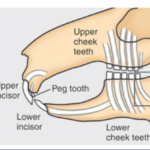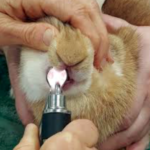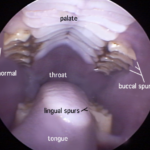Dental disease is one of the most common reasons we see rabbits in the clinic.
Dental problems can present with lots of different symptoms, and although genetics and trauma can play a part, the most common reason for dental issues is being fed an inappropriate diet.
Anatomy
 Rabbits don’t have baby and permanent teeth like humans and dogs. Rabbit teeth are open rooted, meaning they continuously grow. The front incisors can grow as much as 12cm a year!
Rabbits don’t have baby and permanent teeth like humans and dogs. Rabbit teeth are open rooted, meaning they continuously grow. The front incisors can grow as much as 12cm a year!
Rabbits mainly chomp and chew their food, so they don’t need sharp canines to tear meat, they only have incisors, premolars and molars.
What signs do I look out for?
The main signs of dental disease are not eating, weight loss, drooling, swelling of the face, discharge from the eyes, reduced grooming and caecotroph accumulation around the bottom.
 What will my vet do to diagnose dental problems?
What will my vet do to diagnose dental problems?
- Take a patient history, especially focusing on diet
- Physical exam
- Oral exam – looking at both the front incisor teeth, and the cheek teeth with an otoscope (sometimes rabbits don’t like this very much so may need some sedation to get a proper look)
What are the most common dental issues?
Most often the front teeth (incisors) become overgrown, and the cheek teeth (premolars and molars) have small spurs that can damage the inside of the mouth and cause pain.
What treatment will my rabbit need?
 As rabbit teeth are structured differently to ours, they can be easily burred when they are overgrown. Often sedation isn’t necessary as it is a painless process.
As rabbit teeth are structured differently to ours, they can be easily burred when they are overgrown. Often sedation isn’t necessary as it is a painless process.
If your rabbit has a problem where the jaws are not aligned properly (malocclusion), then they may require regular trimming, or your vet may discuss with you about removal of the teeth.
More serious conditions such as tooth root abscesses or trauma will require more complex treatment, and your rabbit may require medications such as pain relief and antibiotics.
What can I do to prevent dental problems?
Proper nutrition is essential for preventing dental disease. Rabbits should be fed a diet of predominantly good quality hay, and high fibre food such as leafy greens that encourage grinding motions of the jaw. Commercial rabbit foods should only be fed as a teaspoon of pellets once daily (not the muesli mixes).




